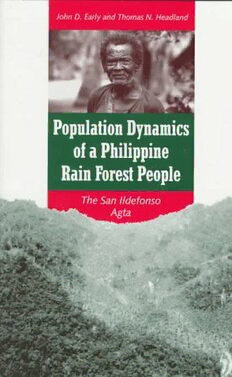
Population Dynamics of a Philippine Rain Forest People: The San Ildefonso Agta PDF
Preview Population Dynamics of a Philippine Rain Forest People: The San Ildefonso Agta
Population Dynamics of a Philippine Rain Forest People Population Dynamics of a University Press of Florida Gainesville Tallahassee Tampa Boca Raton Pensacola Orlando Miami Jacksonville John D. Early Thomas N. Headland hilippine Rain Forest People The San Ildefonso Agta Copyright 1998 by che Board of Regents of the State of Florida Printed in the United States of America on acid-free paper All rights reserved 03 02 01 00 99 98 654321 All photographs copyrighted as listed in captions. Photo at beginning of chapter 1 by Janet Headland, 1963; remaining chapter-opening photos by John Early, 1994. Frontispiece. Right: A traditional Agta hunter shooting an arrow. (Thomas Headland, 1967.) Left: An Agta boy on a bulldozer. (John Early, 1994.) Library of Congress Cataloging-in-Publication Data Early, John D. Population dynamics of a Philippine rain forest people: the San Ildefonso Agta / John D. Early, Thomas N. Headland. p. cm. Includes bibliographical references and index. ISBN 0-8130-1555-3 (cloth: alk. paper) 1. Agta (Philippine people)—Population. 2. Agta (Philippine people)—Social conditions. 3. Agta (Philippine people)—Economic conditions, 4. Logging—Philippines—San Ildefonso. 5. Rain forest ecology—Philippines—San Ildefonso. 6. San Ildefonso (Philippines)—Population. 7. San Hdefonso (Philippines)—Social conditions. 8. San Ildefonso (Philippines)—Economic conditions. I. Headland, Thomas N. II. Title. DS666.A3E37 1998 304.6'2'089991105991—dc21 97-41150 The University Press of Florida is the scholarly publishing agency for the State Universiey System of Florida, comprised of Florida A & M University, Florida Atlantic University, Florida International University, Florida State University, University of Central Florida, University of Florida, University of North Florida, University of South Florida, and University of West Florida. University Press of Florida 15 Northwest 15th Street Gainesville, FL 32611 http://nersp.nerdc.ufl.edu/~upf [OO Dedicated to the memory of Father Morice Vanoverbergh (1885-1982), missionary, linguist, ethnographer, Philippinist, who took the first Agta survey in 1936 | T.N.H. To Stefanie, Robby, David, Craig, and Kristine, who are Grandpa’s reminders of the demographics of the continuing life cycle J.D.E. CL Contents | List of Tables ix List of Figures xi List of Maps xii | Preface xiii Part I. Introduction | 1. The San Ildefonso Agta 3 Part II. Loss of Regional Isolation 2. Loggers, Homesteaders, Civil War, and the Market Economy 25 3. Cultural Change for the Agta 45 Part III. Methodology 4. Fieldwork and the Database 59 5. The Critical Process 68 Part IV. The Demographic Structure 6. Overview of the Population, 1950-1994 81 7. Reproduction 87 8. Mortality 98 9. Migration 119 10. Some Characteristics of the Agta Population 125 Part V. Acculturation 11. The Acculturating Population 149 Part VI. A Comparative Perspective 12. The Population Dynamics of Foraging Societies 169 References Cited 193 Index 203 Tables 2k, Size and Rates of Increase of Philippine Population, Crude Birth and Death Rates, 1885-1995 32 Sed, Lowlander Population of the Municipality of Casiguran, 1948-94, with Boundaries as of 1970 46 Duke Lowlander and Agta Populations of the San Ildefonso Peninsula, 1942-94 47 Sate Time Allocation for Various Activities for Two Agta Groups under Forager and Peasant Conditions 50 4.1. Birth Dates by Quality of Determination 65 4.2. Death Dates by Quality of Determination 66 Sel Examples of Provisional Fertility Histories 70 6.1; Size of San Ildefonso Agta Population and Average Annual Rates of Increase, 1950-94 83 6.2. Overview of San Ildefonso Agta Demographic Structure and Change, 1950-94 84 Fels Ages of the Agta Female Reproductive Cycle 92 ite Length of Birth Intervals 94 Taos Agta Fertility Rates 96 8.1. Agta Mortality Rates 102 8.2. Causes of Death among the Agta, 1950-93 103 8:3. Symptoms, Treatment, and Estimated Case Load: Headlands’ Paramedical Program, 1962-79, 1983-86 107 8.4. Agta Mortality Indices per 1,000 Population for the First Five Years and the Criteria Indicative of the Synergism of Malnutrition and In fectious Disease 111 x / Tables 8.5. Agta Weights (kg) and Heights (cm), 1976, 1983, 1992, 1994 118 9.1. Crude Rates and Number of Migrations, 1950-93, by Phases 120 9.2. Number and Percentage of Reasons for In-migration and Out-migration 121 9.3. Migration for Marriage—by Sex and Population of Partner, 1950-94 123 10.1. Percentage of Agta Children Who Survived One or Both Parents, 1950-94 127 10.2. Percentage Marital Outcomes (Including Trial Marriages) for Individuals, 1950-94, by Age of Ego 128 10.3. Age-Sex Structure of Population, 1950-94, in Percentages by Phases 135 10.4. Size of Population in 1950 and 1994; Numbers and Crude Rates of the Demographic Variables, 1950-94, by Phases 136 10.5. Area, Population, and Density of the Three Agta Subgroups of the San Ildefonso Peninsula 139 10.6. Crude Rates of the Three Agta Subgroups: Koso, Dinipan, and Lower Peninsula, 1950-94 140 11.1. Growth of the Acculturating Population, 1952-94 151 11.2. Sources of the Acculturating Population 153 11.3. Marital Histories of Agta Women in Interethnic Marriages 154 11.4. Demographic Factors in the Growth of the Acculturating Population, 1951-94 157 11.5. Fertility Rates for the Acculturating Population and the Peasant Phase of the Agta Population 158 11.6. Mortality Rates for the Acculturating Population and the Peasant Phase of the Agta Population 162 11.7. Size of the Agta and Acculturating Populations: 1950-94 Actual, 2000-2030 Projected 164 12.1. Survey of Demographic Indices for Some Immediate-Return Foragers 174 12.2. Percentage Causes of Death of All Deaths for Four Cases of Immediate-Return Foragers 183
